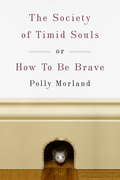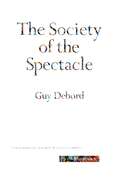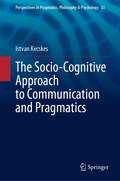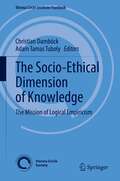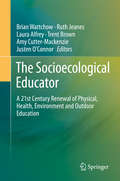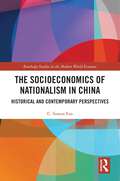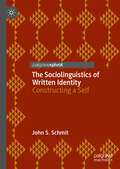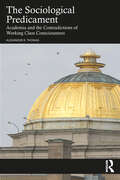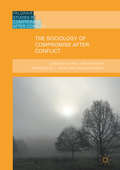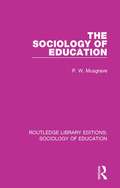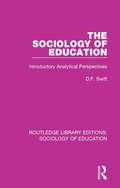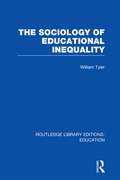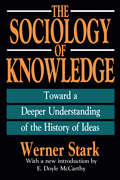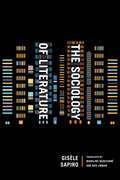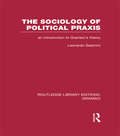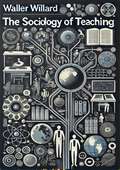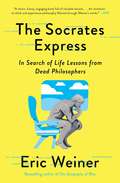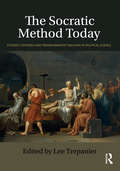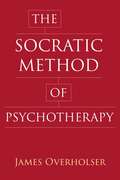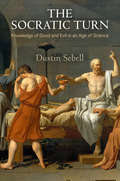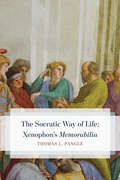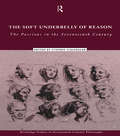- Table View
- List View
The Society of Timid Souls
by Polly MorlandA journey into the modern life of an ancient virtue - bravery - and a quest to understand who might possess it and how With The Society of Timid Souls, or How To Be Brave, documentary filmmaker Polly Morland sets out to investigate bravery, a quality that she has always felt she lacked. The book takes inspiration from a vividly eccentric, and radical, self-help group for stage-frightened performers in 1940s Manhattan, which coincided with the terrifying height of World War II and was called The Society of Timid Souls. Seventy years later, as anxiety about everything from terrorism to economic meltdown continues, Morland argues that courage has become a virtue in crisis. We are, she says, all Timid Souls now. Despite a career in which she has filmed in rebel-held Colombian jungles and at the edge of Balkan mass graves, interviewing convicted murderers, drug-traffickers, and terrorists, Morland herself has never felt brave. Often, the very reverse. So she sets out to discover how and why courage is achieved in an age of anxiety and whether it might even be learned. Drawing on her interviews and encounters with soldiers and civilians, bullfighters and big-wave surfers, dissidents fighting for freedom and cancer patients fighting for their lives, Morland examines bravery across the spectrum: from the first childhood act of defiance by Bernard Lafayette, a leader of the civil rights movement who later faced down the KKK in Alabama, or the reflexive will-to-survive of Vjollca Berisha, a Kosovo Albanian who endured a massacre by playing dead among the bodies of her own family, to the small acts of everyday bravery that quietly punctuate our lives, in schoolyards, labor wards, and hospices the world over. Along the way, Morland draws attention to some of the myths of bravery that have been conjured and perpetuated over time and argues that, often, courage exists as much in the telling as in the doing. At once an exploration of what bravery means and a chronicle of the author's personal journey among those who embody it, The Society of Timid Souls is a profound, approachable meditation on this most valued and mysterious of human qualities. In setting off on the trail of the lionhearted, Polly Morland finds out a great deal about what makes some of us extraordinary, and what of the extraordinary we all share.From the Hardcover edition.
The Society of the Spectacle
by Guy DebordFew works of political and cultural theory have been as enduringly provocative as Guy Debord’s Society of the Spectacle. From its publication amid the social upheavals of the 1960s to the present, the volatile theses of this book have decisively transformed debates on the shape of modernity, capitalism, and everyday life in the late twentieth century. Now finally available in a superb English translation approved by the author, Debord’s text remains as crucial as ever for understanding the contemporary effects of power, which are increasingly inseparable from the new virtual worlds of our rapidly changing image / information culture. <P><P>“In all that has happened in the last twenty years, the most important change lies in the very continuity of the spectacle. Quite simply, the spectacle’s domination has succeeded in raising a whole generation moulded to its laws. The extraordinary new conditions in which this entire generation has lived constitute a comprehensive summary of all that, henceforth, the spectacle will forbid; and also all that it will permit.”— Guy Debord (1988)
The Socio-Cognitive Approach to Communication and Pragmatics (Perspectives in Pragmatics, Philosophy & Psychology #33)
by Istvan KecskesThe book aims to serve as a theoretical framework for the socio-cognitive approach (SCA) that is an alternative to the two main lines of pragmatics research: linguistic-philosophical pragmatics and sociocultural-interactional pragmatics. SCA broadens the scope of the field with an intent to incorporate not only L1 communication but also intercultural communication, and communication in a second language. The author integrates the pragmatic view of cooperation and the cognitive view of egocentrism and emphasizes that both cooperation and egocentrism are manifested in all phases of communication, albeit to varying extents. SCA places equal importance on the social and cognitive individual factors in pragmatics. The author claims that while (social) cooperation is an intention-directed practice that is governed by relevance, (individual) egocentrism is an attention-oriented trait dominated by salience.The book serves as a theoretical guide for researchers and students who would like to understand how we need to change first language-based theories to make sense of what happens not only in L1 but also in intercultural and multi-lingual interactions.
The Socio-Ethical Dimension of Knowledge: The Mission of Logical Empiricism (Vienna Circle Institute Yearbook #26)
by Christian Damböck Adam Tamas TubolyThis book studies how the relationship between philosophy, morality, politics, and science was conceived in the Vienna Circle and how this group of philosophers tried to position science as an antidote to totalitarianism and irrationalism. This leads to investigation of the still understudied views of the Vienna Circle on moral philosophy, meta-ethics, and the relationship between philosophy of science and politics. Including papers from an international group of scholars, The Socio-ethical Dimension of Knowledge: The Mission of Logical Empiricism addresses these topics and makes them available to scholars in the field of history of philosophy of science.
The Socioecological Educator: A 21st Century Renewal of Physical, Health,Environment and Outdoor Education
by Amy Cutter-Mackenzie Justen O'Connor Ruth Jeanes Trent Brown Laura Alfrey Brian WattchowThis volume offers an alternative vision for education and has been written for those who are passionate about teaching and learning, in schools, universities and in the community, and providing people with the values, knowledge and skills needed to face complex social and environmental challenges. Working across boundaries the socio-ecological educator is a visionary who strives to build community connections and strengthen relationships with the natural world. The ideas and real-world case studies presented in this book will bring that vision a step closer to reality.
The Socioeconomics of Nationalism in China: Historical and Contemporary Perspectives (Routledge Studies in the Modern World Economy)
by C. Simon FanThis book analyzes Chinese nationalism from the perspective of social economics. It posits a conceptual framework in which national status is treated as a "luxury" while material consumption is considered as a "necessity" in people’s preferences, which implies that popular nationalism tends to increase with economic development. The book extensively uses the tools of game theory and behavioral economics to analyze inter-ethnical and international conflicts in historical and contemporary China. The author’s economic approach to the subject of nationalism brings fresh and critical insights into the Chinese historical events and relations with foreign countries. For example, it helps resolve the following puzzles: Why did most Chinese support an ethnic minority, the Manchus, to be their ruler after the collapse of the Ming dynasty? In the Boxer Rebellion, why did the Qing dynasty declare war against more than eight foreign powers when it knew well that any of the countries could defeat China easily? What are the fundamental causes of the 1962 Sino-Indian War and the 1979 Sino-Vietnamese War? Who is responsible for the bombing of the Chinese Embassy in Belgrade? This book attempts to answer the questions based on the theories of social economics and rational choice, which will interest those researching on nationalism, China studies, international relations, history and political economy.
The Sociolinguistics of Written Identity: Constructing a Self
by John S. SchmitThis book examines the ways in which a writer’s presentation of self can achieve or impede access to power. Conversations about written voice and style have traditionally revolved around the aesthetics of stylistic choice. These choices, while they help establish a writer’s presence in a text, too often ignore the needs of written identity as it crosses genres, disciplines, and rhetorical purposes. In contrast to stylistic investigations of a writer’s "voice" and its various components—diction, detail, imagery, syntax, and tone, for example—this book focuses on language variation and the linguistic features of a writer’s presence in a text, as well as the establishment of a writer’s social, cultural, and personal identity in a given text. The author attempts to explain the methods by which writers present themselves to their audiences. This book will be of particular interest to students and teachers of rhetoric and composition studies, as well as writers more broadly.
The Sociological Predicament: Academia and the Contradictions of Working Class Consciousness
by Alexander ThomasA sociological phenomenon afflicts sociology itself: academics think of themselves as the vanguard of the working class despite the fact that they are not working class, as the noble willingness to side with the oppressed contrasts scholars’ reliance on authority to bolster their politics.While there are no simple solutions to this contradiction, a necessary beginning is for sociologists (and other academics) to acknowledge the reality of their own class privilege as members of the professional-managerial class. The Sociological Predicament is then a conscious and deliberate work of professional self-loathing that traces the evolution of ideologies found in academia from the mid-twentieth century to today, which demonstrates the ways in which biases around class have given short shrift to the concerns of working class Americans in deindustrialized cities and towns that have ultimately turned away from and then against them.Intellectuals have not historically been on the side of the oppressed but have been instrumental in developing ideologies that sustain the status quo, and this book crucially asks whether academics’ presence on the left ultimately serves conservative ends.
The Sociology of Compromise after Conflict (Palgrave Studies in Compromise after Conflict)
by John D. BrewerThis book introduces a new and original sociological conceptualization of compromise after conflict and is based on six-years of study amongst victims of conflict in Northern Ireland, South Africa and Sri Lanka, with case studies from Sierra Leone and Colombia. A sociological approach to compromise is contrasted with approaches in Moral and Political Philosophy and is evaluated for its theoretical utility and empirical robustness with in-depth interview data from victims of conflicts around the globe. The individual chapters are written to illustrate, evaluate and test the conceptualization using the victim data, and an afterword reflects on the new empirical agenda in victim research opened up by a sociological approach to compromise. This volume is part of a larger series of works from a programme advancing a sociological approach to peace processes with a view to seeing how orthodox approaches within International Relations and Political Science are illuminated by the application of the sociological imagination.
The Sociology of Education (Routledge Library Editions: Sociology of Education #40)
by P W MusgraveFirst published in 1979, this third edition of The Sociology of Education at the time held the field as the standard textbook on the subject. It takes into account the changes that occurred in the field from the publication of the first edition in 1965 and the second edition in 1972. The book is divided into three parts: the first considers the way in which the child becomes a social being and the influences upon them of the family, the peer group and the mass media; the second deals with the sociology of schooling and looks at different types and stages of schools, as well as the attitudes and forms of interaction within them; and finally the third traces the relationship between education and social institutions, and looks at the balance between the preservation of social stability and the introduction of change.
The Sociology of Education: Introductory Analytical Perspectives (Routledge Library Editions: Sociology of Education #54)
by Donald Francis SwiftFirst published in 1969, this book examines the educational process as a whole in relation to its society. The discussion is set within a specifically sociological frame of reference and looks at the school as an organisation as well as the social environment surrounding the school. It concludes by considering some of the basic issues concerning the functions of education for society. Written at a time when sociological studies of education were scarce, this ground-breaking work will be of interest to those studying education and its relationship with society.
The Sociology of Educational Inequality (Routledge Library Editions: Education)
by William TylerWhat is the most significant factor for explaining why some individuals are more successful than others – genetic inheritance, privileged background or luck? Although conventional approaches stress the prime importance of one of these, Tyler argues that such theories fail to deal adequately with the complexity of educational inequality and suggests that Boudon’s model of opportunity and mobility would provide us with a more productive explanation. By applying this model to post-war British education he shows how we might effectively think our approaches to the ‘cycle of deprivation’, comprehensive reform and educational spending.
The Sociology of Knowledge: Toward a Deeper Understanding of the History of Ideas (International Library Of Sociology Ser.)
by Werner StarkThis volume serves as both an introduction to the field of the sociology of knowledge and an interpretation of the thought of the major figures associated with its development More than a compendium of ideas, Stark seeks here to put order into what he regarded as a diffuse tradition of diverse bodies of thought, in particular the seemingly irreconcilable conflict between the study of the political element in thought identified here with Karl Mannheim and the investigation of the social element in thinking associated with the work of Max Scheler.The sociology of knowledge is primarily directed toward the study of the precise ways that human experience, through the mediation of knowledge, takes on a conscious and communicable shape. While both schools dealt with by Stark assume that the pursuit of truth is not purposeful apart from socially and historically determined structures of meaning, the tradition extending from Marx to Mannheim seeks to expose hidden factors that turn us away from the truth while that of Weber and Scheler attempts to identify social forces that impart a definite direction to our search for itIn order to reconcile opposing theoretical positions, Stark seeks to lay the foundations for a theory of the social determination of thought by directing his inquiry to the philosophical problem of truth in a manner compatible with cultural sociology. Stark's theoretical legacy to the sociology of knowledge is that social influences operate everywhere through a group's ethos. From this, many systems of ideas and social categories emanate, revealing partial glimpses of a synthetic whole.The outcome of Stark's work is a general theory of social determination remarkably consistent with contemporary interests in the broad range of cultural studies, whose focus is best described as the use of philosophical, literary, and historical approaches to study the social construction of meaning. The Sociology of Knowledge will be of great interest to social scientists, philosophers, and intellectual historians.
The Sociology of Literature
by Gisèle SapiroThe Sociology of Literature is a pithy primer on the history, affordances, and potential futures of this growing field of study, which finds its origins in the French Enlightenment, and its most salient expression as a sociological pursuit in the work of Pierre Bourdieu. Addressing the epistemological premises of the field at present, the book also refutes the common criticism that the sociology of literature does not take the text to be the central object of study. From this rebuttal, Gisèle Sapiro, the field's leading theorist, is able to demonstrate convincingly one of the greatest affordances of the discipline: its in-built methods for accounting for the roles and behaviors of agents and institutions (publishing houses, prize committees, etc.) in the circulation and reception of texts. While Sapiro emphasizes the rich interdisciplinary nature of the approach on display, articulating the way in which it draws on literary history, sociology, postcolonial studies, book history, gender studies, and media studies, among others, the book also stands as a defense of the sociology of literature as a discipline in its own right.
The Sociology of Philosophies
by Randall CollinsRandall Collins traces the movement of philosophical thought in ancient Greece, China, Japan, India, the medieval Islamic and Jewish world, medieval Christendom, and modern Europe. What emerges from this history is a social theory of intellectual change, one that avoids both the reduction of ideas to the influences of society at large and the purely contingent local construction of meanings. Instead, Collins focuses on the social locations where sophisticated ideas are formed: the patterns of intellectual networks and their inner divisions and conflicts.
The Sociology of Political Praxis (RLE (RLE (RLE (RLE (RLE (RLE (RLE (RLE: Gramsci): An Introduction to Gramsci's Theory
by Leonardo SalaminiThis volume analyses the philosophical nature of Gramsci’s Marxism and its Hegelian source, the radical critique of the economistic tradition and the original analyses of the role of superstructures, ideology, consciousness and subjectivity in the revolutionary process. It relates the central themes of Gramsci’s writings, such as hegemony, ‘historical blocs’, the role of intellectuals and political praxis, to the more peripheral ones, such as science, language, literature and art. The introduction includes a brief intellectual biography of Gramsci.
The Sociology of Postmarxism (Routledge Advances in Sociology)
by Richard HowsonPostmarxism is often depicted as a point of intersection for a set of inter-disciplinary theories that are in themselves complex and dense. Bringing the postmarxist theory of Ernesto Laclau into the field of political sociology through a close reading and analysis of postmarxism and its relationship to ‘the social’, A Sociology of Postmarxism develops key postmarxist arguments in an engaging and sociologically applicable way. Indeed, through a threefold method of analysis, Howson first unpacks the relationship between ‘the social’ and ‘the political’ by analysing key allied theories to show where the points of connection occur. This is then followed by an insightful analysis of the key features of postmarxist theory such as antagonism and the inevitability of social dislocation, the political importance of hegemony; and the empty signifier thesis and equivalence to show how such theory can be applied at a sociological level. Finally, through the use of sociological categories such as masculinities, migration and social capital, the foregoing theoretical analyses are synthesised to show the social nature of postmarxism and particularly in the context of aspiration and co-operation. This enlightening volume will appeal to undergraduate and postgraduate students, as well as postdoctoral researchers who are interested in fields such as Political Sociology, Post Marxist Political Theory and Social Theory.
The Sociology of School Organization: Contemporary Sociology of the School (Routledge Library Editions: Sociology of Education #30)
by Ronald KingFirst published in 1983, this volume assembles recent theory on school organization, drawing on a wide range of research, mainly on schools in contemporary Britain but with some illuminating historical and overseas comparisons. It examines elements of organization both within and outside the school, and shows how they vary with the age, sex, ethnicity and social class of pupils, as well as school size and efficiency. It argues how, with understanding, organizational patterns may be changed to respond to new objectives and how they may become more effective and responsive to human needs in schools and classrooms.
The Sociology of Teaching
by Waller Willard"The Sociology of Teaching" by Waller Willard is a groundbreaking exploration of the complex social dynamics that shape the educational environment. Willard, a pioneering sociologist, provides a comprehensive analysis of the interactions between teachers, students, and the institutional structures within which they operate. This seminal work delves into the sociological aspects of teaching, offering profound insights into the roles, relationships, and cultural norms that influence the educational process.Willard's detailed examination covers various dimensions of the teaching profession, including the authority and social status of teachers, the impact of organizational culture on educational practices, and the intricate socialization processes that occur within schools. He explores the ways in which teachers' identities and behaviors are shaped by their social contexts, as well as the expectations and pressures imposed by society and educational institutions.One of the key contributions of "The Sociology of Teaching" is its analysis of the teacher-student relationship. Willard investigates how power dynamics, communication patterns, and social expectations influence interactions in the classroom. He highlights the reciprocal nature of this relationship, showing how both teachers and students affect and are affected by each other's behaviors and attitudes.Willard also addresses the broader societal implications of education, discussing how schools serve as agents of socialization, transmit cultural values, and contribute to social stratification. His work underscores the importance of understanding the social context of teaching to develop more effective educational policies and practices."The Sociology of Teaching" is an essential read for educators, sociologists, and policymakers interested in the intersection of education and society. Willard's rigorous research and insightful analysis provide a valuable framework for examining the social dimensions of teaching, making this book a timeless resource for those seeking to understand and improve the educational system.
The Socrates Express: In Search of Life Lessons from Dead Philosophers
by Eric WeinerThe New York Times bestselling author of The Geography of Bliss embarks on a rollicking intellectual journey, following in the footsteps of history&’s greatest thinkers and showing us how each—from Epicurus to Gandhi, Thoreau to Beauvoir—offers practical and spiritual lessons for today&’s unsettled times.We turn to philosophy for the same reasons we travel: to see the world from a different perspective, to unearth hidden beauty, and to find new ways of being. We want to learn how to embrace wonder. Face regrets. Sustain hope. Eric Weiner combines his twin passions for philosophy and travel in a globe-trotting pilgrimage that uncovers surprising life lessons from great thinkers around the world, from Rousseau to Nietzsche, Confucius to Simone Weil. Traveling by train (the most thoughtful mode of transport), he journeys thousands of miles, making stops in Athens, Delhi, Wyoming, Coney Island, Frankfurt, and points in between to reconnect with philosophy&’s original purpose: teaching us how to lead wiser, more meaningful lives. From Socrates and ancient Athens to Beauvoir and 20th-century Paris, Weiner&’s chosen philosophers and places provide important practical and spiritual lessons as we navigate today&’s chaotic times. In a &“delightful&” odyssey that &“will take you places intellectually and humorously&” (San Francisco Book Review), Weiner invites us to voyage alongside him on his life-changing pursuit of wisdom and discovery as he attempts to find answers to our most vital questions. The Socrates Express is &“full of valuable lessons…a fun, sharp book that draws readers in with its apparent simplicity and bubble-gum philosophy approach and gradually pulls them in deeper and deeper&” (NPR).
The Socratic Method Today: Student-Centered and Transformative Teaching in Political Science
by Lee TrepanierThis exciting new textbook provides a sophisticated examination of the Socratic method for teaching political science students in higher education. It shows how the Socratic method is employed in the Platonic dialogs, compares its transformative approach to other student-centered teaching philosophies, and addresses the challenges of adopting the Socratic method in the contemporary classroom. The book is divided into three sections that integrate these practical aspects on the Socratic method with the theoretical considerations of Socratic philosophy while also addressing contemporary concerns about teaching and learning in higher education. Section One explores how the Socratic method is portrayed by Socrates in Plato’s dialogs. Section Two compares the Socratic method with modern and contemporary accounts of teaching and learning. Section Three examines some of the contemporary challenges of practicing the Socratic method in the university classroom today and how teachers can overcome them. Written in a clear and engaging style, this timely intervention is essential reading for upper undergraduate students enrolled in courses that specialize in pedagogical techniques, political theory, Socratic philosophy, and law.
The Socratic Method of Psychotherapy
by James OverholserAs the field of psychotherapy focuses more on treatment manuals and the regimented nature of clinical research, the practice risks losing the subtle nuances that guide the interactive fluidity of therapy sessions. Can clinicians combat this loss by incorporating ideals from ancient philosophy into contemporary psychotherapy? In The Socratic Method of Psychotherapy, James Overholser approaches cognitive therapy through the interactive dialogues of Socrates, aiming to reduce the gap between theory and practice. Clinicians and students will appreciate the flexibility and creativity that underlie effective psychotherapy sessions when guided by the Socratic method as an innovative approach to self-exploration.
The Socratic Turn
by Dustin SebellThe Socratic Turn addresses the question of whether we can acquire genuine knowledge of good and evil, right and wrong. Reputedly, Socrates was the first philosopher to make the attempt. But Socrates was a materialistic natural scientist in his youth, and it was only much later in life--after he had rejected materialistic natural science--that he finally turned, around the age of forty, to the examination of ordinary moral and political opinions, or to moral-political philosophy so understood.Through a consideration of Plato's account of Socrates' intellectual development, and with a view to relevant works of the pre-Socratics, Xenophon, Aristotle, Hesiod, Homer, and Aristophanes, Dustin Sebell reproduces the course of thought that carried Socrates from materialistic natural science to moral-political philosophy. By doing so, he seeks to recover an all but forgotten approach to the question of justice, one still worthy of being called scientific.
The Socratic Way of Life: Xenophon’s “Memorabilia”
by Thomas L. PangleThe Socratic Way of Life is the first English-language book-length study of the philosopher Xenophon’s masterwork. In it, Thomas L. Pangle shows that Xenophon depicts more authentically than does Plato the true teachings and way of life of the citizen philosopher Socrates, founder of political philosophy. In the first part of the book, Pangle analyzes Xenophon’s defense of Socrates against the two charges of injustice upon which he was convicted by democratic Athens: impiety and corruption of the youth. In the second part, Pangle analyzes Xenophon’s account of how Socrates’s life as a whole was just, in the sense of helping through his teaching a wide range of people. Socrates taught by never ceasing to raise, and to progress in answering, the fundamental and enduring civic questions: what is pious and impious, noble and ignoble, just and unjust, genuine statesmanship and genuine citizenship. Inspired by Hegel’s and Nietzsche’s assessments of Xenophon as the true voice of Socrates, The Socratic Way of Life establishes the Memorabilia as the groundwork of all subsequent political philosophy.
The Soft Underbelly of Reason: The Passions in the Seventeenth Century (Routledge Studies in Seventeenth-Century Philosophy #No.1)
by Stephen GaukrogerThis book provides a valuable understanding on the different views of the passions in the Seventeenth Century. The contributors show that fundamental questions about the nature of wisdom, goodness and beauty were understood in terms of the contrast between reason and passions in this era. Those with an interest in philosophy , the history of medicene, and women's studies will find this collection a fascinating read.
